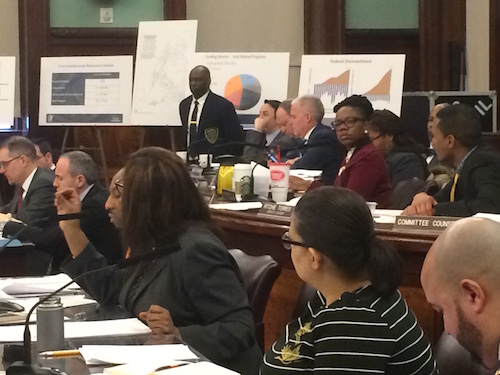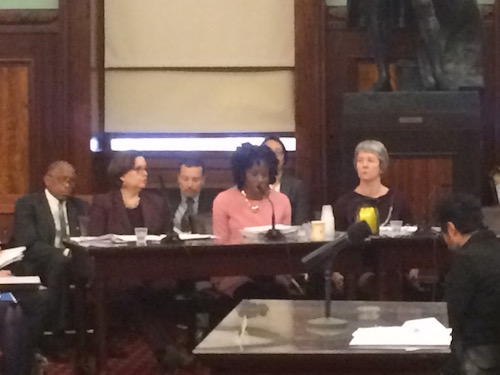Embattled New York City Housing Authority (NYCHA) Chair Shola Olatoye today passed the buck on the authority’s inability to provide proper heat this winter to some 320,000 of the 390,000 public housing residents on a lack of federal funding.

Olatoye made her comments as one of the key people testifying about NYCHA’s multiple boiler and heat outages before a joint City Council hearing of the Public Housing, and Oversight and Investigations Committees.
“We understand what it means to our residents when NYCHA doesn’t get the funding we need to carry out our mission,” said Olatoye, pointing to a $3 billion loss in federal funding for capital improvements since 2001 as the blame for the problem.
“We are doing everything we can, working around the clock to restore heat for residents as quickly as possible. However, if we truly want to resolve this issue, we must address the root cause of these problems and secure sufficient funding,” she added.

City Councilwoman Alicka Ampry-Samuel (D-Brownsville, East New York), in her first role as chair of the Public Housing Committee, chose to tackle the NYCHA heating crisis head on, demanding answers from Olatoye and public housing officials, calling their lack of oversight and response during the heating crisis a moral and legal failure.
“We owe it to the residents to find out what’s going on at NYCHA. Imagine if we found out that a private landlord wasn’t providing heat to 80% of all of their residents. Imagine what we would all be saying right now? We wouldn’t just being saying, ‘Oh gee, he messed up.’ We would be talking about punishment. We would be talking about fines and we would be talking about jail,” said Ampry-Samuel.
Samuel is a NYCHA alum having grown up in a Brownsville NYCHA development. She also previously worked under Olatoye as senior advisor within NYCHA’s Community Engagement and Partnerships Division. Additionally her council district has an overwhelming 100 NYCHA buildings within its parameters.

“Today we are going to make sure we get to the bottom of this [heating crisis]. NYCHA is not living up to the basic standard of providing residents with a livable home. I’m here to make sure there is accountability, from the Chair of NYCHA all the way down to the building manager and the boiler repair team,” added Samuel.
Flanking Ampry-Samuel was Council Speaker Corey Johnson (D-Manhattan) and Committee Chair of Oversight and Investigations Councilman Ritchie Torres (D-Bronx), who echoed the same sentiments, urging NYCHA for answers and solutions to the issue.
“So, I have some pretty straightforward questions for this hearing–how on earth could you let this happen? How did we get here? We can’t sit here and wait for the other shoe to drop. We’ve got to get a handle on this,” said Johnson.
Other NYCHA officials went on to note the lack of heating staff due to gaps in funding. According to NYCHA Executive Vice President & Chief Administrative Officer, Kerri Jew, there has been a loss of heating plant technician (HPT) staff since 2013. Starting in 2013 the number of HPTs fell from 391 to 241 by 2017, a loss of 100 workers.
According to Jew, the HPT exam hasn’t been offered by 2015 and training for the civil service position hasn’t been offered since 2016. An average HPT services four plants and the turn-over rate for the position is about 3 years, she said.
A point that wasn’t lost in the hearing was also NYCHA’s inability to prevent catastrophic heating failures. Back in 2009 the housing authority launched Maximo, a software system to create, assign and track Work Orders to perform maintenance and repair work requested by residents or initiated by NYCHA.
Maximo was meant as a tool to help NYCHA track trends and help prevent crisis’. However, the housing authority has yet to fully implement the system into their repair network citing a lack of training and instead still opts for a written logbook attached to every boiler, as their oversight system.
“I would agree that our move to this technology needs work and that this is absolutely an error that we need to dig through. There has been a lot of effort to bring technology to this organization, as with any introduction of new technology, we have to train people,” said Olatoye.
This is yet another setback for the embattled city authority who late last year faced controversy in the wake of a Department of Investigations (DOI) report that revealed Olatoye had failed to conduct lead paint inspections in 55,000 units and then falsely certified that the agency was in compliance.
Through it all, Mayor Bill de Blasio has refused to fire Olatoye, steadfastly saying she is doing a great job.
In an unusual bureaucratic move, Samuel allowed NYCHA residents to open the hearing forcing public housing officials to listen to complaints and demands first before giving their testimony.
Lisa Kenner, a 58-year resident of public housing and president of the Van Dyke Resident Association in Brownsville, directed her concerns specifically toward the boilers.
“I didn’t come to beat up on nobody, I came up here to find some solutions. Van Dyke got five boilers and we’ve had problems way before this chair came about heat and hot water. You know when people are turning on the ovens for hot water and heat, that’s a safety issue. But you have to go to bed but you might not wake up. I know what it’s like to wear a sweat suit to bed. I want to wear pajamas,” said Kenner.
Kenner, went on to suggest a boiler technician apprenticeship program to fill the needs-gap at the authority. A program she hopes could not only help with maintenance of the aging heating system but also as a job creation program for local residents.










